Insider
Trading and White Collar
Crime
Story
Written by Rick Archer
October 2014
While we cover our
mouths in horror at the evils of criminals and organized crime, I
don't think anyone would argue that the behavior of many businessmen
is any less corrupt.
"My father used to
always say to me that, you know, if a guy goes out to steal a
loaf of bread to feed his family, they'll give him 10 years, but
a guy can do white-collar crime and steal the money of thousands
and he'll get probation and a slap on the wrist." - - Jesse
Ventura
"The possibility of
bringing white-collar criminals to justice is ever receding over
the horizon." - - Sara Paretsky
The subject of "White
Collar Crime" is so vast that I can't do justice to the topic.
So I will limit myself to a few examples that are easy to understand
and hope I have said enough to make my point.
And what is my point?
•
Take sides. Neutrality helps the
oppressor, never the victim. Silence encourages the tormentor,
never the tormented.
-- Elie Wiesel, accepting the Nobel
Peace Prize
•
If
humanity does not opt for integrity, we are through completely. It is
absolutely touch and go. Each one of us could make the difference.
--
Buckminster Fuller
|
|
|
|
Albert H.
Wiggin
|
Albert Wiggin was the man who became a multi-millionaire during the
Wall Street crash of 1929. Mr. Wiggin wasn't your average
cheat. In fact, in certain circles he was a well-respected
man. You see, Albert Wiggin was the head of Chase National
Bank.
He didn't even go to to
jail for his cheating. What he did was perfectly legal.
During the Roaring '20s,
many Wall Street professionals, and even some of the general public,
knew Wall Street was a rigged game run by powerful investing pools.
Suffering from a lack of
disclosure and an epidemic of manipulative rumors, people believed
coattail investing and momentum investing were the only viable
strategies for getting in on the profits. Unfortunately, many
investors found that the coattails they were riding were actually
smokescreens for hidden sell orders that left them holding the bag.
Still, while the market kept going up and up, these setbacks were
seen as a small price to pay in order to get in on the big game
later on. In October, 1929, the big game was revealed to be yet
another smokescreen.
After the crash, the public was hurt, angry, and hungry for
vengeance. Albert H. Wiggin, the respected head of Chase National
Bank, seemed an unlikely target until it was revealed that he
shorted 40,000 shares of his own company. This is like a boxer
betting on his opponent – a serious conflict of interest.
Using wholly-owned family corporations to hide the trades, Wiggin
built up a position that gave him a vested interest in running his
company into the ground. There were no specific rules against
shorting your own company in 1929, so Wiggin legally made $4 million
from the 1929 crash and the shakeout of Chase stock that followed. (source)
Not only was this legal
at the time, but Wiggin had also accepted a $100,000 a year pension
for life from the bank. He later declined the pension when the
public outcry grew too loud to ignore. Wiggin was not alone in his
immoral conduct, and similar revelations led to a 1934 revision of
the 1933 Securities Act that was much sterner toward insider
trading. It was appropriately nicknamed the "Wiggin Act".
|
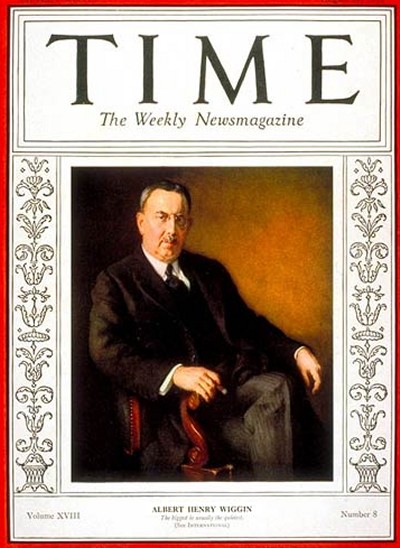
Albert Henry
Wiggin is our poster boy for the Myth of Business Ethics
|
|
|
|
|
|
Martha
Stewart
|
 |
On the cover of the May 1995 issue, New
York Magazine declared her "the definitive American woman of our
time".
Ten years later she was convicted of
insider trading. Despite a net worth of $700 million at the
time, Stewart jeopardized everything to save $45,000.
Due to her
prominence, Martha Stewart became the poster girl for insider
traders who get
caught.
Despite the window
dressing of the "Wiggin Act" and many other laws like it, "Insider
Trading" goes on and on whether we like to admit it or not. The
story of Martha Stewart's insider trading is not important because
it was remarkable.
Just the opposite. Stories similar to
Martha Stewart happen to lesser-known people all the time.
Stewart's story is important because it hints at just how
commonplace insider trading is.
What we don't know is
how easy it is to get away with it because we lack statistics on the
frequency of successful cheating. Instead all we have are the
sordid tales of the ones who got caught.
So what happened?
In December 2001, the Food and Drug Administration (FDA) gave news
to ImClone CEO Samuel Waksal
that it was rejecting ImClone's new cancer drug, Erbitux.
Since the
drug represented a major portion of ImClone's pipeline, Waksal knew the
company's stock was about to take a sharp dive.
Many pharmaceutical
investors were hurt by the drop, but oddly enough, the family and friends of ImClone CEO Samuel Waksal
were not among them.
Among those with a preternatural knack for guessing the FDA's
decision days before the announcement was homemaking guru Martha
Stewart. She sold 4,000 shares when the stock was still trading in
the high $50s and collected nearly $250,000 on the sale. The
timing was absolutely perfect. The stock
would plummet to just over $10 in the following months.
Stewart claimed to have a pre-existing sell order with her broker,
but her story continued to unravel. Perhaps Stewart thought
her lawyers would find a loophole because in public she seemed to
treat the whole thing as a joke.
|
The best example of her
cavalier attitude came on national TV on 25 June 2002. CBS
anchor Jane Clayson grilled Stewart on the air about ImClone during
Stewart's regular segment on The Early Show. Stewart didn't bat an
eyelash. She continued chopping cabbage and famously quipped,
"I just want to focus on my salad".
However, any way Stewart
tossed her salad, this problem
wasn't going away. Public shame eventually forced her to
resign as the CEO of her own company, Martha Stewart Living Omnimedia.
Stewart was sentenced to
the minimum of five months in prison and fined $30,000. In
August 2006, the SEC announced that it had agreed to settle the
related civil case against Stewart. Under the settlement, Stewart
agreed to disgorge $58,062 (including interest from the losses she
avoided), as well as a civil penalty of three times the loss
avoided, or $137,019.
So how did Stewart get
caught?
Immunologist Sam Waksal
founded ImClone in 1984. The New York-based biotech firm remained
relatively unknown until 1999, when it announced the creation of
Erbitux — a cancer-fighting drug so promising it convinced
pharmaceutical giant Bristol-Myers to purchase $1 billion of ImClone
stock in one of the largest biotechnology partnerships in U.S.
history.
But when the Food and
Drug Administration rejected the drug, Waksal alerted several
relatives and friends to dump their stock as soon as possible —
before the FDA's decision had been made public.
Waksal's father and
daughter sold $9.2 million worth of ImClone, a move that caught the
attention of the SEC and eventually led to his arrest.
In retrospect, Waksal had made a rash and highly
foolish move. His action was not only highly illegal, it stuck
out like a red flag.
Martha Stewart's
situation was more complicated. Although Stewart was a friend
of Sam Waksal, he had actually done nothing to tip Stewart off personally. Waksal had not spoken to Stewart at all day.
What happened was that
Stewart and Waksal used the same Merrill Lynch stockbroker, Peter
Bacanovic. Although neither Bacanovic nor his assistant, Doug
Faneuil, knew about the Erbitux decision, both men could see plain as
day that Waksal was trying to dump his stock.
When Bacanovic arrived
at the office on the fateful morning, his assistant Doug Faneuil
told Bacanovic about a flurry of selling by the Waksal family that
morning. Even though they didn't
know 'why' Waksal was dumping stock, they could read the warning
signals. Something was badly wrong over at ImClone.
Bacanovic turned to Faneuil and blurted: "Oh my God, get Martha on
the phone."
On their advice, Stewart
promptly sold all her shares at the highest possible price before
the big plunge kicked in the following day.
Martha Stewart was not
caught directly. It was Sam Waksal who was caught red-handed.
And since Bacanovic was both Waksal and Stewart's broker,
Bacanovic's involvement is what indirectly led the investigators
onto Stewart's trail.
Strangely enough,
although what Stewart had done was unethical, it probably was on the
borderline of being legal. Technically speaking, Stewart had
merely traded on a tip passed on by her stockbroker. That is
what investors do all the time - follow the advice of their
stockbroker.
Insider trading is only
illegal when a person bases their trade of stocks in a public
company on information that the public does not know. It is illegal
to trade your own stock in a company based on this information but
it is also illegal to give someone that information, a tip, so they
can trade their stock. Stewart had not traded stock in her own
company. Nor had she been informed by Sam Waksal. That
put her into a gray area of sorts.
However, Stewart also
knew Bacanovic had breached his duty as a broker when he told her
about Waksal’s trades. In other words, she knew full well what she was
doing was wrong. Seeing how Bacanovic had put 2 and 2 together
and made a clever deduction, she expected to fly under the radar.
What happened instead is
that
Still, had she come
clean at the start, Stewart would have likely gotten away with a
wrist slap and a fine. Stewart actually caused her own demise
by lying about what she knew.
The nuances in Stewart’s case ultimately drove the government to
back down from charging her with insider trading. Instead, it
focused its case on the lies she told to cover the trade. When
questioned by the SEC and the FBI in the months following her trade,
Stewart said she had no knowledge of Waksal’s trade and that she had
sold on a standing agreement with her broker to sell if shares
traded below $60. Bacanovic corroborated the story, but his
assistant Faneuil eventually came forward and revealed the truth,
furthering the case against Stewart. Later, Stewart’s own assistant,
Annie Armstrong, testified that Stewart had tried to change a record
of Bacanovic’s phone message to her about ImClone.
Some people consider it
beyond amazing that Stewart was able to resurrect her career
following her release from prison.
Scott Turow is a
well-known author of fiction involving legal cases. His
comments on Stewart's behavior goes right to the point.
What the jury felt
Martha Stewart did -- lying about having received inside
information before she traded -- is wrong, really wrong. And the
fact that so many on Wall Street have unashamedly risen to her
defense is galling -- galling because what she did actually
harms the market. Wall Street leaders should be expressing
chagrin that a corporate tycoon -- who was also a member of the
New York Stock Exchange board -- could feel free to fleece an
unwitting buyer.
Virtually everybody who takes Ms. Stewart's side conveniently
ignores the fact that there was some poor schmo (or schmoes) out
there who bought her shares of ImClone.
Those buyers, no
matter how diligent, no matter how much market research they
read, no matter how many analysts' reports they studied, could
not have known what Martha Stewart did: that the Waksal family
was dumping shares. In my book, that's fraud.
Martha Stewart
ripped her buyers off as certainly as if she'd sold them silk
sheets that she knew were actually synthetic.
In addition to being fraud, her actions were also a type of
theft. She didn't learn about the Waksals and ImClone by
overhearing idle talk on an elevator. According to Mr. Faneuil's
testimony, he (under Mr. Bacanovic's orders) gave her the
confidential information that was supposed to have stayed within
the walls of their firm, Merrill Lynch. Stewart had to know
she was in possession of confidential information she had no
right to have, and by trading on it, she was a clear accessory
to the Merrill employees' misappropriation of it.
It's true that Martha Stewart was not accused of securities
fraud for selling her ImClone stock, because, the prosecutors
said, historically no one else had been charged criminally with
insider trading in similar circumstances. But Martha Stewart
didn't make false statements to a federal agency because she
thought her conduct in the sale was blameless. She did it to
cover her tracks.
Furthermore, the
right response to those Wall Streeters who point out that she
was not indicted for insider trading is to ask, why not?
Why would any sane person want to buy stock if Wall Street
bigwigs can palm off shares that they know, on the basis of
secret information, are about to nose dive?
What is wrong with
our laws that such obvious misconduct can't be charged
criminally?
-- Scott Turow
(source)
|
|
| |
|
The 60
Minutes Segment About Congressional Insider Trading
Rick Archer's Note:
Do you know what an
'oxymoron' is? No, it is not another name for an idiot
Congressman. An oxymoron is a figure of speech in which
apparently contradictory terms appear in conjunction.
We are going to explore
the concept of "honest graft". Now those are two words
I never expected to see side by side.
According to the SEC,
trading stocks based on advance knowledge of action in Congress is
not considered 'insider trading'.
Others disagree. According to the Washington-based consumer
rights advocacy group Public Citizen, if one takes a look at the
statistics, members of Congress are either geniuses when it comes to
stock trading or they are in fact trading off of some of this
insider information.
Several published studies have implied that members of Congress are
in fact profiting from insider information.
A pair of 2011 academic studies found that House members beat the
market in their personal stock trading by about 6 percent. The
Senators did even better. They beat the market by about 10
percent.
A 2011 study entitled Abnormal Returns from the Common Stock
Investments of Members of the U.S. House of Representatives analyzed
16,000 common stock transactions made by around 300 House delegates
between 1985 and 2001. The study revealed
the findings of four university professors that a portfolio
replicating the purchases of House members beat the market by 55
basis points per month, or six percent annually. It also found that purchases made by
Democrats outperformed those of Republicans.
Then one day 60
Minutes got wind of these findings.
On a personal note,
I can't believe I missed
a story as incredible as this one, but I guess I was busy at the
time. However, when I saw this story as I did research, my
mouth fell wide open. I was stunned to discover it is
perfectly legal for Congressman to exploit the inside knowledge they
are privy to for their own personal gain.
You don't believe me?
Well, read on.
|
Back in 2011, Steve
Kroft of the CBS news program 60 Minutes uncovered a doozy of
a story... yes, indeed, it really is LEGAL for Congressmen to engage
in Insider Trading.
In 2006, Democratic
Representatives Louise Slaughter and Tim Walz introduced the
STOCK Act (Stop Trading On Congressional Knowledge). This
legislation was intended to stop members of Congress from benefiting
from insider knowledge of stocks.
The legislation went
nowhere.
It was placed on the congressional backburner — that
is, until it was featured on CBS's 60 Minutes. The 60 Minutes
episode which aired on Sunday, November 13, 2011, created a
firestorm of protest.
Overnight the bill garnered a significant number of co-sponsors in the Congress.
By the following Friday, the number of co-sponsors of the bill had
shot from 9 to 91. President Obama would
sign the Stock Act into law on 4 April 2012.
|
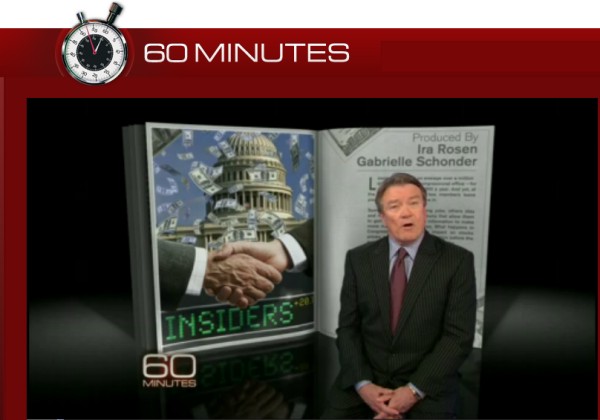 |
| |
|
Transcript of
Steve Kroft's Insider Trading Episode
(source)
The following is a script
of "Insiders" which aired on 13 November 2011.
Steve Kroft was the correspondent, Ira Rosen and Gabrielle Schonder
were the
producers.
|
Introduction
Steve Kroft reports that
members of Congress can legally trade stock based on non-public
information from Capitol Hill
Washington, D.C. is a town that runs on inside information - but
should our elected officials be able to use that information to pad
their own pockets?
As Steve Kroft reports,
members of Congress and their aides have regular access to powerful
political intelligence, and many have made well-timed stock market
trades in the very industries they regulate. For now, the practice
is perfectly legal, but some say it's time for the law to change.
The next national election is now less than a year away and
congressmen and senators are expending much of their time and their
energy raising the millions of dollars in campaign funds they'll
need just to hold onto a job that pays $174,000 a year.
Few of them are doing it for the salary and all of them will say
they are doing it to serve the public. But there are other benefits:
Power, prestige, and the opportunity to become a Washington insider
with access to information and connections that no one else has, in
an environment of privilege where rules that govern the rest of the
country, don't always apply to them.
It has long been
suspected that most former congressmen and senators manage to leave Washington
- if they ever leave Washington at all - with more money in their
pockets than they had when they arrived.
As you are about to
see, the biggest challenge is often avoiding temptation.
Honest Graft -
Steve
Kroft
Interview with Peter Schweizer
|
Peter Schweizer
is a fellow at the Hoover Institution, a conservative think
tank at Stanford University.
A year ago he
began working on a book about soft corruption in Washington
with a team of eight student researchers, who reviewed
financial disclosure records.
It became a
jumping off point for our own story, and we have
independently verified the material we've used.
Schweizer says he wanted to know why some congressmen and
senators managed to accumulate significant wealth beyond
their salaries, and proved particularly adept at buying
and selling stocks.
Peter
Schweizer: This is a venture opportunity.
This is an
opportunity to leverage your position in public service
and use that position to enrich yourself, your friends,
and your family.
|
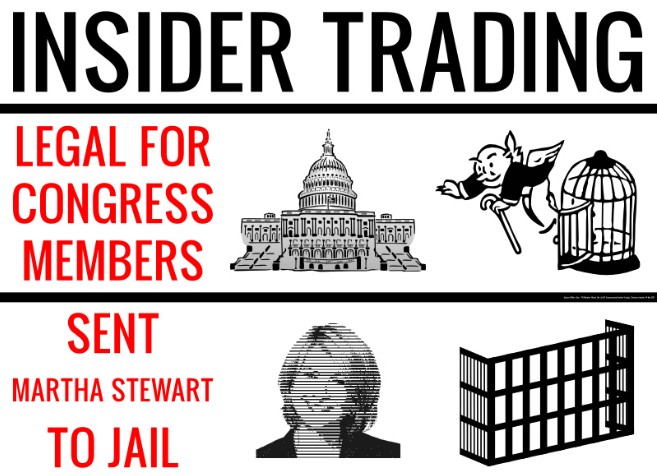 |
Peter Schweizer:
There are all sorts of forms of honest graft that
congressmen engage in that allow them to become very, very
wealthy. So it's not illegal, but I think it's highly unethical,
I think it's highly offensive, and wrong.
Steve Kroft: What do you mean by 'honest graft'?
Schweizer: For example insider trading on the stock
market. If you are a member of Congress, those laws are deemed
not to apply.
Kroft: So congressman get a pass on insider trading?
Schweizer: They do. The fact is, if you sit on a
healthcare committee and you know that Medicare, for example,
is-- is considering not reimbursing for a certain drug that's
market moving information. And if you can trade stock on-- off
of that information and do so legally, that's a great profit
making opportunity. And that sort of behavior goes on.
Kroft: Why does Congress get a pass on this?
Schweizer: It's really the way the rules have been
defined. And the people who make the rules are the political
class in Washington. And they've conveniently written them in
such a way that they don't apply to themselves.
The buying and selling
of stock by corporate insiders who have access to non-public
information that could affect the stock price can be a criminal
offense, just ask hedge fund manager Raj Rajaratnam who recently got
11 years in prison for doing it.
But, congressional lawmakers have no corporate responsibilities and
have long been considered exempt from insider trading laws, even
though they have daily access to non-public information and plenty
of opportunities to trade on it.
Schweizer: We
know that during the health care debate people were trading
health care stocks. We know that during the financial crisis of
2008 they were getting out of the market before the rest of
America really knew what was going on.
Spencer
Bachus
In mid September 2008
with the Dow Jones Industrial average still above ten thousand,
Treasury Secretary Hank Paulson and Federal Reserve Chairman Ben
Bernanke were holding closed door briefings with congressional
leaders, and privately warning them that a global financial meltdown
could occur within a few days. One of those attending was Alabama
Representative Spencer Bachus, then the ranking Republican
member on the House Financial Services Committee and now its
chairman.
Schweizer:
These meetings were so sensitive-- that they would actually
confiscate cell phones and Blackberries going into those
meetings. What we know is that those meetings were held one day
and literally the next day Congressman Bachus would engage in
buying stock options based on apocalyptic briefings he had the
day before from the Fed chairman and treasury secretary. I mean,
talk about a stock tip.
While Congressman Bachus was
publicly trying to keep the economy from cratering, he was
privately betting that it would, buying option funds that would
go up in value if the market went down. He would make a variety
of trades and profited at a time when most Americans were losing
their shirts.
Rick Archer's Note:
In the interest of fairness, I took a look at what Wikipedia
had to say about Spencer Bachus.
In
2007, Bachus was falsely accused of insider trading.
He
was subsequently cleared by the Office of Congressional
Ethics. The Congressional Ethics inquiry stemmed from an
allegation by Peter Schweizer and later reported by
60 Minutes that Bachus made trades with a number of
short term stock options, betting that stocks would rise
or fall for a quick profit or loss.
Schweizer claimed that from July through November 2008,
Bachus traded in options at least forty times. During
this period, Bachus was one of the Congressional leaders
getting private briefings from Secretary of the Treasury
Hank Paulson and Federal Reserve Bank Chairman Ben
Bernanke about the worsening financial crisis.
Bachus said that he "never trades on non public
information, or financial services stocks".
On
April 30, 2012 the Office of Congressional Ethics
announced that they had found no evidence of violations
of insider-trading rules and recommend that the case
against him be closed.
Roderick Hills and Harvey Pitt, former Chairmen of the
Securities and Exchange Commission who reviewed the
accusations, wrote "the original source for these
allegations was a sensational, but factually inaccurate,
book, followed by an adulatory (but equally inaccurate)
'60 Minutes' segment about it. The allegations in the
book, vis-à-vis Mr. Bachus, are inaccurate; far worse,
however, is that these allegations are laughable to
serious students of insider trading law."
Wikipedia
Congressman Bachus
declined to talk to us, so we went to his office and ran into his
Press Secretary Tim Johnson.
Kroft: Look
we're not alleging that Congressman Bachus has violated any
laws. All...the only thing we're interested in talking to him is
about his trades.
Tim Johnson: Ok...Ok that's a fair enough request.
What we got was a
statement from Congressman Bachus' office that he never trades on
non-public information, or financial services stock. However, his
financial disclosure forms seem to indicate otherwise. Bachus made
money trading General Electric stock during the crisis, and a third
of GE's business is in financial services.
John
Boehner
During the healthcare debate of 2009, members of Congress were
trading health care stocks, including House Minority Leader John
Boehner, who led the opposition against the so-called public option,
government funded insurance that would compete with private
companies. Just days before the provision was finally killed off,
Boehner bought health insurance stocks, all of which went up. Now
speaker of the House, Congressman Boehner also declined to be
interviewed, so we tracked him down at his weekly press conference.
Kroft: You made a number of
trades going back to the health care debate. You bought some
insurance stock. Did you make those trades based on non-public
information?
John Boehner: I have not made any decisions on day-to-day
trading activities in my account. And haven't for years. I
don't-- I do not do it, haven't done it and wouldn't do it.
(Republican
Speaker John Boehner's office would later call his inclusion
into this 60 Minutes story "idiotic.")
Later Boehner's
spokesman told us that the health care trades were made by the
speaker's financial adviser, who he only consults with about once a
year.
Peter Schweizer: We need to
find out whether they're part of a blind trust or not.
Peter Schweizer thinks
the timing is suspicious, and believes congressional leaders should
have their stock funds in blind trusts.
Schweizer:
Whether it's uh-- $15,000 or $150,000, the principle in my mind
is that it's simply wrong and it shouldn't take place.
But there is a long history of self-dealing in Washington. And
it doesn't always involve stock trades.
Dennis
Hastert
Congressmen and senators also seem to have a special knack
for land and real estate deals. When Illinois Congressman Dennis
Hastert became speaker of the House in 1999, he was worth a few
hundred thousand dollars.
He left the job eight years later a
multi-millionaire.
Jan Strasma: The road that
Hastert wants to build will go through these farm fields right
here.
In 2005, Speaker Hastert
got a $207 million federal earmark to build the Prairie Parkway
through these cornfields near his home. What Jan Strasma and his
neighbors didn't know was that Hastert had also bought some land
adjacent to where the highway is supposed to go.
Strasma: And five months
after this earmark went through Hastert sold that land and made
a bundle of money.
Kroft: How much?
Strasma: Two million dollars.
Kroft: What do you think of it?
Strasma: It stinks.
We stopped by the former
speaker's farm, to ask him about the land deal, but he was off in
Washington where he now works as a lobbyist. His office told us that
property values in the area began to appreciate even before the
earmark and that the Hastert land was several miles from the nearest
exit.
Judd
Gregg
The same good fortune befell former New Hampshire Senator Judd
Gregg. Gregg helped steer nearly $70 million dollars in government
funds towards redeveloping this defunct Air Force base, which he and
his brother both had a commercial interest in. Gregg has said that
he violated no congressional rules.
Nancy Pelosi
Gregg's good fortune is but one more
example of good things happening to powerful members of Congress. Another is the access to initial public stock offerings
(IPOs), the
opportunity to buy a new stock at insider prices just as it goes on
the market. IPOs can be incredibly lucrative and hard to get.
Schweizer: If
you were a senator, Steve, and I gave you $10,000 cash, one or
both of us is probably gonna go to jail. But if I'm a corporate
executive and you're a senator, and I give you IPO shares in
stock and over the course of one day that stock nets you
$100,000, that's completely legal.
Former House Speaker
Nancy Pelosi and her husband have participated in at least eight
IPOs. One of those came in 2008, from Visa, just as a troublesome
piece of legislation that would have hurt credit card companies,
began making its way through the House. Undisturbed by a potential
conflict of interest the Pelosis purchased 5,000 shares of Visa at
the initial price of $44 dollars. Two days later it was trading at
$64. The credit card legislation never made it to the floor of the
House.
Congresswoman Pelosi also declined our request for an interview, but
agreed to call on us if we attended a news conference.
Kroft: Madam
Leader, I wanted to ask you why you and your husband back in
March of 2008 accepted and participated in a very large IPO deal
from Visa at a time there was major legislation affecting the
credit card companies making its way through the-- through the
House.
Nancy Pelosi: But--
Kroft: And did you consider that to be a conflict of
interest?
Pelosi: The-- y-- I-- I don't know what your point is of
your question. Is there some point that you want to make with
that?
Kroft: Well, I-- I-- I guess what I'm asking is do you
think it's all right for a speaker to accept a very
preferential, favorable stock deal?
Pelosi: Well, we didn't.
Kroft: You participated in the IPO. And at the time you
were speaker of the House. You don't think it was a conflict of
interest or had the appearance--
Pelosi: No, it was not--
Kroft: --of a conflict of interest?
Pelosi: --it doesn't-- it only has appearance if you
decide that you're going to have-- elaborate on a false premise.
But it-- it-- it's not true and that's that.
Kroft: I don't understand what part's not true.
Pelosi: Yes sir. That-- that I would act upon an
investment.
Congresswoman Pelosi pointed out that
the tough credit card legislation eventually passed, but it was two
years later and was initiated in the Senate.
Pelosi: I
will hold my record in terms of fighting the credit card
companies as speaker of the House or as a member of Congress up
against anyone.
(Democratic
Congresswoman Nancy Pelosi's office would later call this
60 Minutes
report a "right-wing smear.")
Corporate executives, members of the executive branch and all
federal judges are subject to strict conflict of interest rules. But
not the people who write the laws.
Peter Schweizer: If
you are a member of Congress and you sit on the defense
committee, you are free to trade defense stock as much as you
want. If you're on the Senate banking committee you can trade
bank stock as much as you want. This practice regularly goes on
in all these committees.
Brian Baird
Brian Baird is a former
congressman from Washington state who served six terms in the house
before retiring last year. He spent half of those 12 years trying to
get his colleagues to prohibit insider trading in Congress and
establish some rules governing conflicts of interest.
Brian Baird:
There should only be one thing in your mind when you're drafting
legislation, 'Is this good for the United States of America?'
That's it. If you're starting to say to yourself 'how's this
going to affect my investments,' you've got-- you've got a mixed
agenda and a mixed purpose for being there.
Baird: One line in a bill in Congress can be worth
millions and millions of dollars. There was one night, we had a
late, late night caucus and you could kind of tell how a vote
was going to go the next day. I literally walked home and I
thought, 'Man, if you-- if you went online and made some
significant trades, you could make a lot of money on this.'
You could just see it. You could see the potential here
to get rich.
So in 2004, Baird and
Congresswoman Louise Slaughter introduced the Stock Act which would
make it illegal for members of Congress to trade stocks on
non-public information and require them to report their stock trades
every 90 days instead of once a year.
Kroft: How
far did you get with this?
Baird: We didn't get anywhere. Just flat died. Went
nowhere.
Kroft: How many cosponsors did you get?
Baird: I think we got six.
Kroft: Six doesn't sound like a very big amount.
Baird: It's not, Steve. You could have 'National
Cherry Pie Week' and get 100 cosponsors at the drop of a hat.

When Brian Baird finally managed to get a congressional hearing on the
Stock Act, almost no one showed up. Since then, the Stock Act
is reintroduced every session,
but is buried so deep in the Capitol we had trouble finding
congressmen who had even heard of it.
[Rick Archer's Note:
At this point, Steve Kroft attempted to buttonhole various
members of Congress. Here were their reactions.]
Kroft: Have
you ever heard of the Stock Act?
Steve Palazzo: The what?
Kroft: The Stock Act. Do you know anything about it?
Congressman Palazzo: No.
Kroft: Congressman Quayle, have you ever heard of the
Stock Act?
Congressman Quayle: I haven't heard about that one yet.
Kroft: Congressman Watt, have you ever heard of something
called the Stock Act?
Congressman Watt: No.
Male voice: I've heard about it, but not much. I can't
say it's an issue I've spent a lot of time on.
Another Male voice: I would have no problem with that.
Kroft: Okay.
Male voice: But then again I am a big fan of, you know,
instant disclosure on almost everything.
Kroft: They're looking for co-sponsors.
Male voice: And yet, I've never heard of it.
Baird: When you have a bill
like this that makes so much sense and you can't get the
co-sponsorships, you can't get the leadership to move it, it
gets tremendously frustrating. Set aside that it's the right
thing to do, it's good politics. People want their Congress to
function well. It still baffles me.
But what baffles Baird
even more is that the situation has gotten worse. In the past few
years a whole new totally unregulated, $100 million dollar industry
has grown up in Washington called Political Intelligence.
'Political Intelligence' employs former
congressmen and former staffers to scour the halls of the Capitol
gathering valuable non-public information in a manner akin to mining
for nuggets of gold. These "miners" then turn around and sell
their information to hedge
funds and traders on Wall Street who can trade on it.
Baird: Now if
you're a political intel guy, you get that information long
before it's public. Long before somebody wakes up the next
morning and reads or watches the television or whatever, you've
got it.
And you can make
real-time trades before anybody else.
Baird says "political
intelligence" has taken
what would be a criminal enterprise anyplace else in the country and
turned it into a profitable business model.
Baird: The
town is all about people saying-- what do you know that I don't
know. This is the currency of Washington, D.C. And it's that
kind of informational currency that translates into real
currency. Maybe it's over drinks maybe somebody picks up a
phone. And says you know just to let you know it's in the bill.
Trades happen. Can't trace 'em.
If you can't trace 'em,
it's not illegal. It's a pretty great system. You feel like an
idiot to not take advantage of it.
|
White Collar Crime
It is depressing to know
that all walks of life are rife with cheaters.
|
As much as we like to
point fingers at the Russians, American athletes are no strangers to
cheating. Think "Lance Armstrong", "Marion Jones", and
steroids in baseball. Nevertheless, even in this arena, we can
shrug our shoulders and still go on to enjoy our lives. Some people
even begin to take sports less seriously.
|
 |
|
|
|
We also know that there
are people who taking cheating at cards and dice to the level of art
form.
Why not mark your cards
with a special dye that only your special contact lens or sunglasses
is able to see?
Wouldn't it be fun to
seem so damn smart?
It is one thing to lose
to a cheater at Scrabble, Bridge, or Chess, even at the highest
levels.
Fortunately, unless we
make a living at games, most of us can live with the experience and still go
on to lead comfortable lives.
|
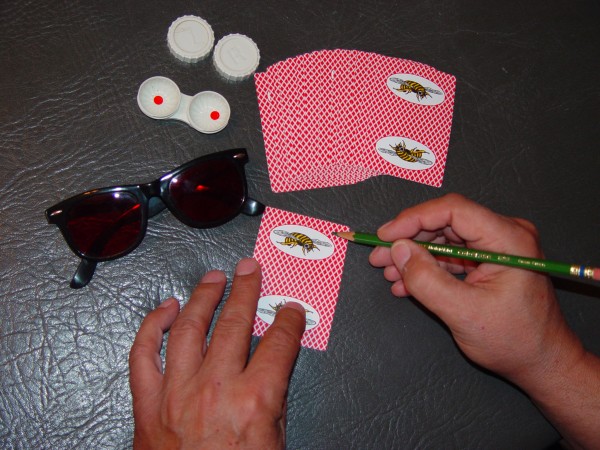 |
|
|
|
However, when it comes to
cheating in other areas of our lives such as business and medicine,
this kind of corruption affects all of us in profound ways.
Many years ago, upon my
stockbroker's advice, I invested practically my entire savings in
oil stocks. This was back in the early Eighties.
I saw practically my entire investment go down the
drain when the price of oil plummeted drastically.
As it turned out, the
perilous downfall was due to a serious surplus of crude oil caused
by falling demand following the 1970s Energy Crisis.
This
resulted in an enormous oil glut. The world price of oil,
which had peaked in 1980 at over US$35 per barrel ($100 per barrel
today), fell in 1986 from $27 to below $10.
During the oil crisis,
my stockbroker advised me to sell and cut my losses. So that's
what I did. I noticed he made commissions on the sale of these
ruined stocks as well. Hmm.
The stockbroker gave me
lousy advice, yet he made money on the purchase of the oil stocks
and he made money on the sale of oil stocks. He cleaned up and
I was wiped out.
It didn't seem right
that this incompetent broker made money while I was losing it based
on his recommendation.
No other profession that
I can think of rewards losers so consistently.
All I got from my
stockbroker in return was an apology and a valuable lesson - this
investment game is for people who take it very seriously, not for
the average guy like me.
I concluded there are
people out there who know far too many things I do not and that this
advantage would always doom me to remain in the loser's bracket.
I have never invested another dime in the stock market.
This decision has
allowed me to watch scandals like Enron, the Savings and Loan
fiascos, the 2008 collapse of Wall Street, and the existence of
morally-bereft monsters like Bernie Madoff with the equanimity that
can only come from not having my own ass on the line.
While I have not
suffered direct consequences from these events, I have watched in
sadness as other people's lives were ruined.
|

Back in the
Eighties, no doubt somebody knew that there was a coming oil
surplus, but it wasn't me. I was one of the "schmoes" who paid
the price of ignorance.
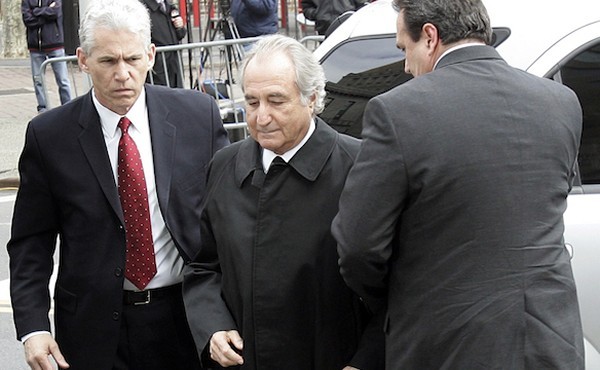
Something the
average American doesn't know is there were people in watchdog
positions who were tipped off about Madoff on several occasions but
did nothing. The individual who brought Madoff down - Harry
Markopolos - stated he believed Madoff was 'protected' by someone
very high in government.
|
|
|
The Victims
of Enron
|
The
stunning collapse of the once-mighty Enron Corp. was a disaster for
thousands of workers. The fiasco wiped out 12,000 employees
retirement savings and cost 5,000 workers their jobs.
Meanwhile Enron executives scandalously lined their own pockets and
made millions while game-facedly lying to employees and shareholders
alike.
Employees' Retirement Plan Is a Victim as
Enron Tumbles
By RICHARD A. OPPEL Jr.
New York Times (source)
Published: November 22, 2001
The
rapid decline of the Enron Corporation has devastated its
employees' retirement plan, which was heavy with company stock,
and has infuriated workers, who were prohibited from changing
their investments as the stock plunged.
Through the 401(k) retirement plan, employees chose to put much
of their savings in Enron shares, and the company made
contributions in company stock as well. But around the time
Enron disclosed serious financial problems last month, the
company froze the assets in the plan because of an
administrative change. For several weeks, as the stock lost much
of its value, workers stood by helplessly as their retirement
savings evaporated. They were not allowed to switch investments
at all -- even though the plan had far less risky choices.
The unfortunate timing caps a year of pain for Enron's workers.
At the end of last year, the 401(k) plan had $2.1 billion in
assets. More than half was invested in Enron, an energy
conglomerate. Since then, the stock has lost 94 percent of its
value.
At Portland General Electric, the Oregon utility acquired by
Enron four years ago, some workers nearing retirement have lost
hundreds of thousands of dollars. The utility has lined up grief
counselors to help them work through their problems.
''We had some married couples who both worked who lost as much
as $800,000 or $900,000,'' said Steve Lacey, an emergency-repair
dispatcher for Portland General. ''It pretty much wiped out
every employee's savings plan.''
''Shortly after it was frozen, the articles started coming out
about some of the questionable activities of Enron,'' Mr. Lacey
added. ''The stock took a tremendous drop, and we were pretty
much helpless.''
The loss serves as a grim reminder of the danger of relying too
heavily on one investment.
|
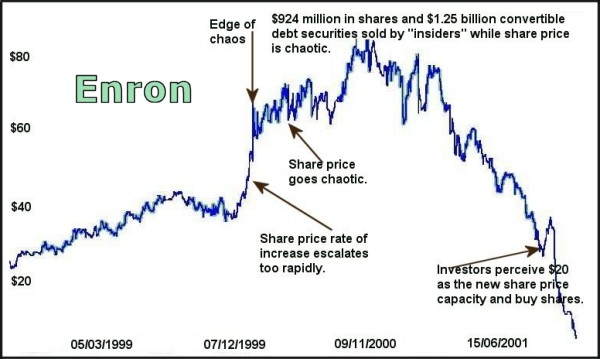
There
were crooks at Enron who cooked the books and deceived the stock
holders at every turn.
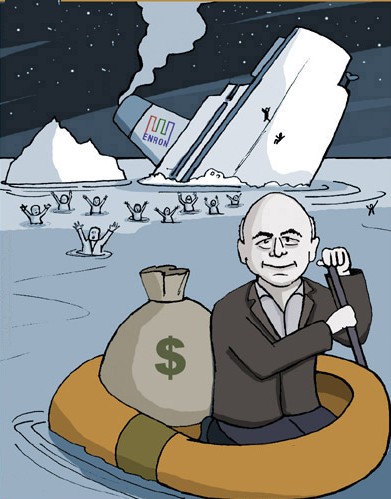
There were
executives at Enron who got out AHEAD of the collapse by cashing in
their stock options.
You don't
suppose they knew something, do you??
|
Rick Archer's Note:
I think Scott Turow said it the best. He made it clear that
when the cheats of the world get away with their insider trading
schemes, the average guy on the street is the one who pays.
• Virtually
everybody who takes Ms. Stewart's side conveniently ignores the
fact that there was some poor schmo (or schmoes) out there who
bought her shares of ImClone.
• Those buyers, no
matter how diligent, no matter how much market research they
read, no matter how many analysts' reports they studied, could
not have known what Martha Stewart did: that the Waksal family
was dumping shares. In my book, that's fraud.
• Martha
Stewart ripped her buyers off as certainly as if she'd sold them
silk sheets that she knew were actually synthetic.
• In addition to being fraud, her actions were also a type of
theft. She didn't learn about the Waksals and ImClone by
overhearing idle talk on an elevator. According to Mr. Faneuil's
testimony, he (under Mr. Bacanovic's orders) gave her the
confidential information that was supposed to have stayed within
the walls of their firm, Merrill Lynch. Stewart had to know
she was in possession of confidential information she had no
right to have, and by trading on it, she was a clear accessory
to the Merrill employees' misappropriation of it.
For
every cheater, there is a long line of victims.
What
Scott Turow is saying is that the "$45,000" that Martha Stewart
saved had to come out of someone's pocket. Various investors
who were completely ignorant of the behind-the-scenes drama at
ImClone unwittingly bought Martha Stewart's shares on ImClone.
And one day later, they gasped as the value of their shares
plummeted drastically.
What I worry about are the
victims. I worry about the people who know they are being shoved to the
back by the cheaters. For example, how many cyclists and how many
baseball players turned to drugs as the only way to stay even with the
competition?
And
how many people avoid the stock market like the plague?
What
this cheating does is make us all cynical. We don't trust the
stock market. We don't trust Wall Street. We don't
trust our politicians.
And we
don't trust our fellow man much either. That is the cost
of cheating... it makes us all believe that this is a dog eat dog
world where the worst behavior is rewarded and honesty is for chumps
and people too stupid to cheat.
As I grow older, I find it
saddening to observe what seems like the collapse of values in a
society. I see one TV show after another where the message is that the
fastest way to get ahead is to climb over the shoulders of the person in
front of them.
Why outwork somebody or be
more creative when you can cheat your way to the top?
And how many people on Wall
Street feel the need to cheat to keep up with the insider trading of
their competitors?
Personally speaking, I don’t
think believe that cheating is the correct path to happiness.
I believe in doing things the right way. I
think that real integrity is doing
things the right way even when no is looking.
However,
I also believe that I have to protect myself.
Many people in this world will cheat if
they think they can get away with it. These people
require external controls. They need to believe
they will be punished if they are caught. And they need to
believe that there is a good chance they are going to be caught.
To me, many of these stories reveal how the
honest people absolutely must work together to expose the cheaters.
Bernie Madoff, for example,
was exposed by a man who was once supremely chewed out by his boss for
underperforming vis a vis Madoff. The man, Harry Markopolos, was made
to feel ashamed because he was being beaten so badly. So Markopolos
decided to study Madoff closely and discover his secret.
And when Markopolos discovered the secret, to his dismay, it took ten years to
get anyone to believe him! And why did it
take so long?
Markopolos said that Madoff was being protected by people in
government. In other words, the cheaters watch out for the
cheaters.
And
that says it all. Our society has become split down the
middle... the honest people trying to defend themselves against
dishonesty in every walk of life.
As they always say, if you
look the other way and take the easy way out, then the cheats become
more confident. The problem is finding the guts to confront and defeat
the cheats before they get too powerful. If people speak up, then maybe
these jerks will think twice.
•
Take sides. Neutrality helps the
oppressor, never the victim. Silence encourages the tormentor,
never the tormented.
-- Elie Wiesel, accepting the Nobel
Peace Prize
•
In the bitter end, we will not
hear the words of our enemies, but the silence of our friends
-- Martin Luther King Jr.
•
In matters of conscience, the
law of majority has no place.
-- Mohandas K. Gandhi
•
It
is your karma to fight evil. It doesn't matter if the people
that evil is being committed against don't fight back. It
doesn't matter if the entire world chooses to look the other
way. Always remember this. You don't live with the consequences
of other people's karma. You live with the consequences of your
own
-- Hindu Proverb
•
First
they came for the socialists, and I did not speak out -- because
I was not a socialist. Then they came for the trade unionists,
and I did not speak out -- because I was not a trade unionist.
Then they came for the Jews, and I did not speak out -- because
I was not a Jew. Then they came for me -- and there was no
one left to speak for me.
--Attributed to Pastor Martin
Niemöller (1892–1984) about the cowardice of German
intellectuals following the Nazis' rise to power and the
subsequent purging of their chosen targets, group after
group.
•
If
humanity does not opt for integrity, we are through completely. It is
absolutely touch and go. Each one of us could make the difference.
--
Buckminster Fuller
Rick Archer
October 2014
rick@ssqq.com
|